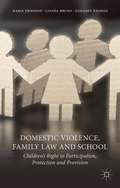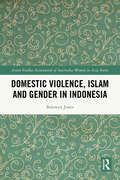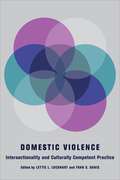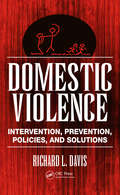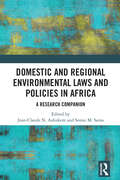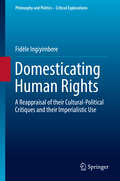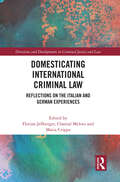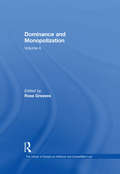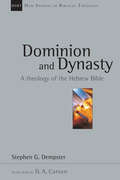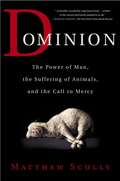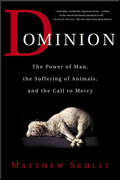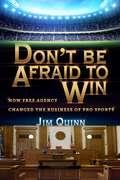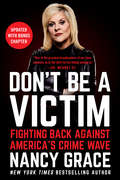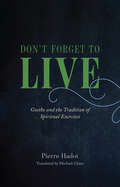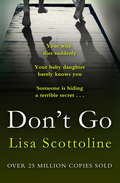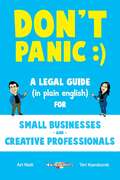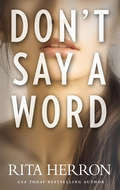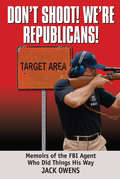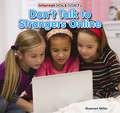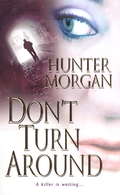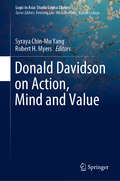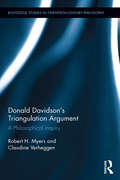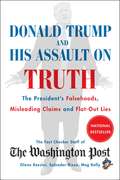- Table View
- List View
Domestic Violence, Family Law and School: Children’s Right to Participation, Protection and Provision
by Maria Eriksson Linnéa Bruno Elisabet NäsmanDomestic Violence, Family Law and School discusses the ways in which domestic violence can impact on children's lives at pre-school and school. Disputes over parental responsibility, living arrangements or child contact can create difficulties not just for the child of disputing parents, but for all children at preschool or school, as well as for staff. This book uncovers new research on an under-explored area of children's lives and social work with vulnerable children and is shaped by a comparative lens that brings both similarities and differences between England, Wales and Sweden into focus. A theoretical framework for analyses of how welfare systems tackle domestic violence is elaborated and lessons for practice that can be drawn from the findings presented are highlighted.
Domestic Violence, Islam and Gender in Indonesia (ASAA Women in Asia Series)
by Balawyn JonesBased on extensive original research, this book explores how the Indonesian Anti-Domestic Violence Law is understood and applied in practice. Drawing on an in-depth case study from the province of Aceh, the book canvasses informal and formal help-seeking avenues for domestic violence victims, including via religious and criminal courts. It is concluded that victim legal rights are currently not well understood or protected in practice, largely due to help-seeking processes being densely gendered and discriminatory against women. Most cases of domestic violence continue to go unreported; cases that are reported are generally mediated informally through adat (customary) justice avenues at the community level; and victims who seek help at the religious and criminal courts continue to face significant barriers to access to justice. Providing an important overview of the current legal and socio-legal systems relevant to domestic violence in Indonesia, this book will be of keen interest to students and scholars of Islamic, gender and Asian studies.
Domestic Violence: Intersectionality and Culturally Competent Practice (Foundations of Social Work Knowledge Series)
by Fran S. Danis Lettie L. Lockhart Eds.In Domestic Violence: Intersectionality and Culturally Competent Practice, experts working with twelve unique groups of domestic abuse survivors provide the latest research on their populations and use a case study approach to demonstrate culturally sensitive intervention strategies. Chapters focus on African Americans, Native Americans, Latinas, Asian and Pacific Island communities, persons with disabilities, immigrants and refugees, women in later life, LGBT survivors, and military families. They address domestic violence in rural environments and among teens, as well as the role of religion in shaping attitudes and behavior. Lettie L. Lockhart and Fran S. Danis are editors of the Council of Social Work Education's popular teaching modules on domestic violence and founding co-chairs of the CSWE symposium on violence against women and children. In their introduction, they provide a thorough overview of intersectionality, culturally competent practice, and domestic violence and basic practice strategies, such as universal screening, risk assessment, and safety planning. They follow with collaborative chapters on specific populations demonstrating the value of generalist social work practice, including developing respectful relationships that define issues from the survivor's perspective; collecting and assessing data; setting goals and contracting; identifying culturally specific interventions; implementing culturally appropriate courses of action; participating in community-level strategies; and advocating for improved policies and funding at local, state, and federal levels. Featuring resources applicable to both practitioners and clients, Domestic Violence forms an effective tool for analysis and action.
Domestic Violence: Intervention, Prevention, Policies, and Solutions
by Richard L. DavisDomestic violence does not begin the day an adult heterosexual male decides to beat and batter an adult heterosexual female. Domestic violence is a complicated and multifaceted enigma that includes child, sibling, spousal, intimate partner, and elder abuse. Despite spending billions of dollars on domestic violence, the number of some categories of
Domestic and Regional Environmental Laws and Policies in Africa: A Research Companion
by Jean-Claude N. Ashukem Semie M. SamaThis book explores African domestic and regional responses and approaches to environmental protection and sustainability. Written by African experts, the collection consists of five parts covering the whole of Africa. It provides broad coverage of specific themes, including environmental constitutionalism, climate change, gender and the environment, wildlife trade, environmental justice, and human displacement. The key aims are first, to explore theoretical and empirical studies to interrogate and provide clarity on academic discourse on how and whether environmental human rights approaches and policy implications have effectively enhanced environmental protection and sustainability at African domestic levels. Second, to investigate and present innovative solutions on how African domestic legal regimes deal with environmental justice, natural resources governance, refugees’ environmental rights, and climate-induced displaced persons. Finally, to propose innovative legal and institutionalised solutions to Africa’s ecological realities by determining the legal and regulatory gaps on environmental human rights issues on the continent. The collection will be a valuable resource for researchers, academics, and policymakers in human rights law, environmental law, political science, ecology and conservation, environmental management, disaster management, and development studies.
Domesticating Human Rights
by Fidèle IngiyimbereThis book develops a philosophical conception of human rights that responds satisfactorily to the challenges raised by cultural and political critics of human rights, who contend that the contemporary human rights movement is promoting an imperialist ideology, and that the humanitarian intervention for protecting human rights is a neo-colonialism. These claims affect the normativity and effectiveness of human rights; that is why they have to be taken seriously. At the same time, the same philosophical account dismisses the imperialist crusaders who support the imperialistic use of human rights by the West to advance liberal culture. Thus, after elaborating and exposing these criticisms, the book confronts them to the human rights theories of John Rawls and Jürgen Habermas, in order to see whether they can be addressed. Unfortunately, they are not. Therefore, having shown that these two philosophical accounts of human rights do not respond convincingly to those the postcolonial challenges, the book provides an alternative conception that draws the understanding of human rights from local practices. It is a multilayer conception which is not centered on state, but rather integrates it in a larger web of actors involved in shaping the practice and meaning of human rights. Confronted to the challenges, this new conception offers a promising way for addressing them satisfactorily, and it even sheds new light to the classical questions of universality of human rights, as well as the tension between universalism and relativism.
Domesticating International Criminal Law: Reflections on the Italian and German Experiences
by Chantal Meloni Florian Jeßberger Maria CrippaThis book provides an essential and critical overview of the most significant issues concerning the domestication of international criminal law, in particular with regard to the implementation of the ICC Statute. It discusses the most recent proposals for reform of the German Völkerstrafgesetzbuch 20 years after its adoption, as well as it introduces the project for an Italian code of international crimes drafted by the Committee of experts established in 2022 by the Ministry of Justice. Following the adoption of the ICC Statute, many States, including Germany with the ‘Völkerstrafgesetzbuch’, introduced specific legislation to incorporate international criminal law into their domestic legal systems and have been investigating and prosecuting war crimes, crimes against humanity, genocide, and even aggression ever since. 25 years later, however, the process is not completed as other countries, like Italy, are still in the way to adopt provisions on international crimes. This book opens with a broad overview of the different approaches of the domestication of international criminal law, with a specific focus on the German and the Italian systems. After an assessment of the prerequisites for the domestic implementation of international criminal law, also from a constitutional law perspective, each chapter offers an in-depth analysis of a specific issue, such as: the definition of international crimes (genocide and crimes against humanity, war crimes and aggression); the applicability of and exceptions to the general principles of domestic criminal law; the regulation of individual criminal responsibility; the sanctioning process; as well as procedural aspects related to immunities, jurisdiction and prosecutorial discretion. The strong academic perspective of the authors is well complemented by an equally strong practitioner perspective, provided by legal scholars in the highest positions in International and national judicial institutions, resulting in a well-informed and critical appraisal of the most recent developments overall in the international criminal justice system. Domesticating International Criminal Law will be of great interest to legal scholars and students, as well as practitioners with an interest in comparative and international law, international criminal law and international relations.
Dominance and Monopolization: Volume II (The Library of Essays on Antitrust and Competition Law)
by Rosa GreavesAntitrust and competition law is a fast moving area of law and the subject of extensive academic research. The aim of this volume is to select articles as tools for understanding how antitrust and competition law is applied to unilateral conduct which is harmful to the consumer and to the competitiveness of the market. The articles examine the meaning of dominance and monopolisation and show that although legal and economic rules have been developed to establish whether undertakings hold such strong market positions, it is often difficult to determine with certainty that the undertaking being investigated meets the threshold. The various debates on pricing and non-pricing conduct are also represented as are the conflicts that have arisen regarding the exercise of intellectual property rights by powerful undertakings, particularly in the context of the new economies. The volume includes scholarly articles published on both sides of the Atlantic and enables a greater understanding of the application of antitrust and competition law from the point of view of economics and politics.
Dominion and Dynasty: A Theology of the Hebrew Bible (New Studies in Biblical Theology #Volume 15)
by Stephen G. DempsterChristian theologians rarely study the Old Testament in its final Hebrew canonical form, even though this was very likely the Bible used by Jesus and the early church. However, once read as a whole, the larger structure of the Hebrew Bible (Tanakh) provides a "wide-angle lens" through which its contents can be viewed. In this stimulating New Studies in Biblical Theology volume, Stephen G. Dempster argues that, despite its undoubted literary diversity, the Hebrew Bible possesses a remarkable structural and conceptual unity. The various genres and books are placed within a comprehensive narrative framework which provides an overarching literary and historical context. The many texts contribute to this larger text, and find their meaning and significance within its story of "dominion and dynasty," which ranges from Adam to the Son of Man, from David to the coming Davidic king. Addressing key issues in biblical theology, the works comprising New Studies in Biblical Theology are creative attempts to help Christians better understand their Bibles. The NSBT series is edited by D. A. Carson, aiming to simultaneously instruct and to edify, to interact with current scholarship and to point the way ahead.
Dominion: The Power of Man, the Suffering of Animals, and the Call to Mercy
by Matthew ScullyAs an eye opening, painful and infuriating, insightful and rewarding book, Dominion is a plea for human benevolence and mercy, a scathing attack on those who would dismiss animal activists as mere sentimentalists, and a demand for reform from the government down to the individual.
Dominion: The Power of Man, the Suffering of Animals, and the Call to Mercy
by Matthew Scully"And God said, Let us make man in our image, after our likeness; and let them have dominion over the fish of the sea, and over the fowl of the air, and over the cattle, and over all the earth, and over every creeping thing that creepeth upon the earth." --Genesis 1:24-26In this crucial passage from the Old Testament, God grants mankind power over animals. But with this privilege comes the grave responsibility to respect life, to treat animals with simple dignity and compassion.Somewhere along the way, something has gone wrong.In Dominion, we witness the annual convention of Safari Club International, an organization whose wealthier members will pay up to $20,000 to hunt an elephant, a lion or another animal, either abroad or in American "safari ranches," where the animals are fenced in pens. We attend the annual International Whaling Commission conference, where the skewed politics of the whaling industry come to light, and the focus is on developing more lethal, but not more merciful, methods of harvesting "living marine resources." And we visit a gargantuan American "factory farm," where animals are treated as mere product and raised in conditions of mass confinement, bred for passivity and bulk, inseminated and fed with machines, kept in tightly confined stalls for the entirety of their lives, and slaughtered in a way that maximizes profits and minimizes decency.Throughout Dominion, Scully counters the hypocritical arguments that attempt to excuse animal abuse: from those who argue that the Bible's message permits mankind to use animals as it pleases, to the hunter's argument that through hunting animal populations are controlled, to the popular and "scientifically proven" notions that animals cannot feel pain, experience no emotions, and are not conscious of their own lives.The result is eye opening, painful and infuriating, insightful and rewarding. Dominion is a plea for human benevolence and mercy, a scathing attack on those who would dismiss animal activists as mere sentimentalists, and a demand for reform from the government down to the individual. Matthew Scully has created a groundbreaking work, a book of lasting power and importance for all of us.
Don't Be Afraid to Win: How Free Agency Changed the Business of Pro Sports
by Jim QuinnLabeled by The New York Times as &“instrumental in helping change the face of major professional sports,&” attorney Jim Quinn has influenced modern sports business for decades. Beginning back in the 1970&’s with the landmark Oscar Robertson basketball free agency case, Quinn battled owners in all four major leagues to make sure the players got their fair share. In the early 1990&’s, he faced the goliath National Football League and won the right to free agency for players, Quinn has spent a lifetime dealing in the gritty sports business to make fair agreements for players. Quinn shares significant cases and legal proceedings across major American sports and tells stories of the courtroom battles he fought on behalf of players and labor leaders seeking economic justice in their workplace. He sheds light on known and unknown figures who committed to larger causes than themselves and that modern sports owes a debt to the leaders of the past who risked their careers. Through Quinn&’s lengthy career he has helped to empower athletes to speak and act in the best interest of the sports community and overcome some of the toxic figures who sought to drag down league success for their own ego and greed. In Don&’t Be Afraid to Win, Quinn provides a unique point of view of someone who was personally involved in making changes happen in the business. His is a masterful examination of how sports has grown dramatically over the decades, how it benefited from the rise of sports unions and free agency, and how there is still fairness to be gained across the leagues.
Don't Be a Victim: Fighting Back Against America's Crime Wave
by Nancy GraceDiscover gripping true crime stories and the surprising tools you need to keep you and your family safe -- from iconic legal commentator, TV journalist, and New York Times bestselling author Nancy Grace.Nancy Grace wasn't always the iconic legal commentator we know today. One moment changed her entire future forever: her fiancé Keith was murdered just before their wedding. Driven to deliver justice for other crime victims, Nancy became a felony prosecutor and for a decade, put the "bad guys" behind bars in inner-city Atlanta.Now, with a new and potentially life-saving book, Nancy puts her crime-fighting expertise to work to empower you stay safe in the face of daily dangers. Packed with practical advice and invaluable prevention tips, Don't Be a Victim shows you how to:Fend off threats of assaults, car-jack and home invasionDefend yourself against online stalking, computer hackers and financial fraudstersStay safe in your own home, at school and other public settings like parking garages, elevators and campsitesProtect yourself while shopping, driving and even on vacationWith insights on so many potential threats, you'll be empowered to protect yourself and your children at home and in the world at large by being proactive! Nancy's crime-fighting expertise helps keep you, your family, and those you love out of harm's way.
Don't Forget to Live: Goethe and the Tradition of Spiritual Exercises (The France Chicago Collection)
by Pierre HadotThe esteemed French philosopher Pierre Hadot’s final work, now available in English. With a foreword by Arnold I. Davidson and Daniele Lorenzini. In his final book, renowned philosopher Pierre Hadot explores Goethe’s relationship with ancient spiritual exercises—transformative acts of intellect, imagination, or will. Goethe sought both an intense experience of the present moment as well as a kind of cosmic consciousness, both of which are rooted in ancient philosophical practices. These practices shaped Goethe’s audacious contrast to the traditional maxim memento mori (Don’t forget that you will die) with the aim of transforming our ordinary consciousness. Ultimately, Hadot reveals how Goethe cultivated a deep love for life that brings to the forefront a new maxim: Don’t forget to live.
Don't Go
by Lisa ScottolineThe New York Times top-ten bestseller from Lisa Scottoline. An emotionally charged novel of family, grief and putting the past to rest.When army doctor Mike Scanlon is posted to Afghanistan, he is aware he might never return to his wife, Chloe, and their newborn baby.But while Mike operates in the midst of a warzone, Chloe dies suddenly in an apparent household accident.As Mike returns to pick up the pieces of his life - and learns to be a father to a child he barely knows - a fatal secret threatens to shatter the fragile balance.Now Mike must put everything on the line as he fights the most important battle of his life. Will it be enough to save his family?
Don't Panic!: A Legal Guide (in Plain English) for Small Businesses and Creative Professionals
by Art Neill Teri KarobonikNewly updated, Don’t Panic :) will prepare you to handle legal issues you’ll encounter in your business and creative work. This book is used in college and graduate classes nationwide to teach non-lawyers the key legal concepts they need to know. <P><P>Whether you are a business, filmmaker, musician, author, or other creator, this book will help you understand what you need to know about the law, and how to avoid getting sued. <P><P>Don't Panic covers a range of legal situations that may arise, from the inception of your business, or the creation of your work, to that dreaded moment (that hopefully doesn’t happen) you get a nasty lawyer letter for the first time. While this book is not a substitute for legal advice, it can serve as a valuable guide to preventing and resolving legal issues. <P><P>The book is organized to help you quickly jump to specific information that will help you through that stage of your work. There are short, straight to the point summaries throughout called “The Bottom Line” providing the essentials you need to know. <P><P>You’ll learn how to form your business, protect your intellectual property, understand E&O insurance, and avoid problems when launching an App or internet-based service. Often, you can take a few simple steps upfront that will protect your business or creative works, and ultimately save time and money down the road.
Don't Pee On My Leg and Tell Me It's Raining: America's Toughest Family Court Judge Speaks Out
by Judy SheindlinJudge Sheindlin, supervising judge for Manhattan Family Court for 10 years, discusses what she sees as a shift on emphasis from individual to government responsibility.
Don't Say a Word
by Rita HerronGroomed by a covert group of elite killers, Damon left the secretsociety to join the FBI after a mission went brutally wrong andan innocent woman died.When his brother is arrested for murder, Damon investigates andfinds a "Jane Doe" who holds the key to the case, along witha darker terror-one that threatens to expose Damon's deadlysecrets and destroy them all. Despite the danger, he's drawn to the nameless beauty, igniting apassion that burns hot between them. But with a madman out tosilence her forever, Damon knows he must deny their love. Andto stop the man responsible, he must return to the one placehe has desperately tried to leave behind-the dark shadows ofa killer's mind....
Don't Share Your Address Online (Internet Dos & Don'ts)
by Shannon MillerIt is smart to be safe online by keeping facts about yourself private. This book will tell you how.
Don't Shoot! We're Republicans!: Memoirs of the FBI Agent Who Did Things His Way
by Jack OwensThe days of J. Edgar Hoover, has been carefully crafted as being polite, clean shaven young men and pleasantly smiling women whose hallmarks are polite words and good manners. Author Jack Owens goes behind that facade and shares the human side of the FBI. With a breezy sweep of the 30 years of his life as a Special Agent, Owens, with his remarkable wit, introduces the reader to a new type of FBI Agent- one who could appreciate the irony and humor of life and laughed and "cussed," yes "cussed", as he met those ironies and idiosyncrasies in the field in Alabama. Owens' shares his unique perspective with the reader from his early days as an FBI trainee through chasing spies, terrorists and assorted "bad guys," putting down a prison riot and setting up roadblocks for desperadoes where, occasionally, he encountered some good people too.
Don't Talk to Strangers Online (Internet Dos & Don'ts)
by Shannon MillerThis book briefs you on online safety and warns against talking to strangers online.
Don't Turn Around
by Hunter MorganDont Trust Anyone. . . Casey McDaniels knows the unbearable consequences of domestic violence--and the darkness that can swallow a life. An advocate for victims rights, Casey is giving key testimony in the arraignment of the man who savagely murdered her best friend. But to her horror, hes set free. . . Dont Let Your Guard Down. . . Hes hiding in plain sight, following a plan that has worked before, performing each move with exact precision, waiting for the perfect moment to strike again--and this time, the victim will be Casey McDaniels. . . And Whatever You Do, Dont Turn Around. . . At first, Casey suspects her friends killer is following her. Shes receiving threats over the phone and bizarre messages in the mail--strange, childlike drawings of human eyes. But then Casey starts to have doubts. Could someone else be stalking her? As Casey enters a deadly cat-and-mouse game, she soon comes face-to-face with her stalker--and her worst nightmare. . .
Donald Davidson on Action, Mind and Value (Logic in Asia: Studia Logica Library)
by Syraya Chin-Mu Yang Robert H. MyersThis book brings together a wide range of innovative reflections on the pivotal role that Davidson’s concept of agency plays in his later philosophy and its impact on his epistemology, his philosophy of language and mind, and his philosophy of values. The authors critically assess central elements of Davidson’s program and offer reappraisals of his seminal contributions to, and his continuing influence on, the development of contemporary philosophy. By focusing on agency, the book reveals Davidson’s views to have been more dynamic and less reductive than previously acknowledged – pointing toward important new possibilities not only in the theory of knowledge, but also in the philosophy of mind.It is a valuable resource both for experts on Davidson’s philosophy and for those interested in central topics in the theory of action, the philosophy of mind and language, epistemology, moral philosophy, and the philosophy of values. It is also of interest to researchers in adjoining disciplines, such as cognitive science, linguistics, and psychology.
Donald Davidson's Triangulation Argument: A Philosophical Inquiry (Routledge Studies in Twentieth-Century Philosophy)
by Robert H. Myers Claudine VerheggenAccording to many commentators, Davidson’s earlier work on philosophy of action and truth-theoretic semantics is the basis for his reputation, and his later forays into broader metaphysical and epistemological issues, and eventually into what became known as the triangulation argument, are much less successful. This book by two of his former students aims to change that perception. In Part One, Verheggen begins by providing an explanation and defense of the triangulation argument, then explores its implications for questions concerning semantic normativity and reductionism, the social character of language and thought, and skepticism about the external world. In Part Two, Myers considers what the argument can tell us about reasons for action, and whether it can overcome skeptical worries based on claims about the nature of motivation, the sources of normativity and the demands of morality. The book reveals Davidson’s later writings to be full of innovative and important ideas that deserve much more attention than they are currently receiving.
Donald Trump and His Assault on Truth: The President's Falsehoods, Misleading Claims and Flat-Out Lies
by The Washington Post Fact Checker StaffA NATIONAL BESTSELLER In perilous times, facts, expertise, and truth are indispensable. President Trump&’s flagrant disregard for the truth and his self-aggrandizing exaggerations, specious misstatements, and bald-faced lies have been rigorously documented and debunked since the first day of his presidency by The Washington Post&’s Fact Checker staff.Donald Trump and His Assault on Truth is based on the only comprehensive compilation and analysis of the more than 16,000 fallacious statements that Trump has uttered since the day of his inauguration. He has repeated many of his most outrageous claims dozens or even hundreds of times as he has sought to bend reality to his political fantasy and personal whim. Drawing on Trump&’s tweets, press conferences, political rallies, and TV appearances, The Washington Post identifies his most frequently used misstatements, biggest whoppers, and most dangerous deceptions. This book unpacks his errant statements about the economy, immigration, the impeachment hearings, foreign policy, and, of critical concern now, the coronavirus crisis as it unfolded. Fascinating, startling, and even grimly funny, Donald Trump and His Assault on Truth by The Washington Post is the essential, authoritative record of Trump&’s shocking disregard for facts.
